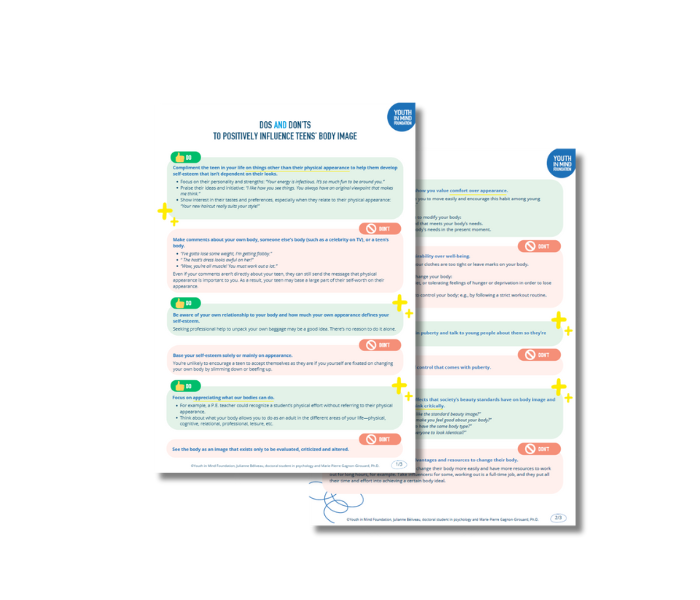BEING A POSITIVE MODEL FOR TEENS’ BODY IMAGE
BEING A POSITIVE MODEL FOR TEENS’ BODY IMAGE
Co-author: Julianne Béliveau, doctoral candidate in psychology, Université du Québec à Trois-Rivières
During puberty, a teen’s body changes in ways that greatly affect how they relate to it. For some, puberty means their physical appearance diverges from the stereotypical beauty ideals, creating a sense that they’re no longer in control. At this point, they may become dissatisfied with their body.
As they go through these years of great change, teenagers may look to their loved ones for guidance on how to respond to their body. Without realizing it, you are a role model for young people’s body image. Parents typically exert the most direct influence, but grandparents, uncles, aunts, godparents, teachers, and sports coaches have an important role to play too!
Here are a few practical tips to help you adopt the right attitude and have a positive impact on the young people in your life.
👀 Check out the downloadable info sheet below to learn about body positive attitudes to adopt and ideas on what to say!
Reassess your body beliefs
Feeling good about your body isn’t always easy–even as an adult.
According to a recent survey conducted by ÉquiLibre, 65% of Quebec adults say they’re dissatisfied with their weight.1 Society’s body ideals affect us all. Starting in childhood, we internalize the constant message that a slim, muscular body is synonymous with beauty, health, and success. Placing this single standard of beauty on a pedestal makes it very hard for us to appreciate our own body.
Given this reality, helping young people relate to their own body can be challenging.
Let’s start by taking stock of our own biases!
❌One widespread belief about the body is that it can be modified to match the beauty ideal. The problem with this belief is that it dismisses all non-conforming bodies outright and makes them responsible for failing to attain the ideal image
✅ Recent studies show that 50% to 75% of our weight is determined by our genetic make-up.2 Contrary to popular belief, weight is not just a matter of willpower or adopted behaviour. Hormones, age, gender, stress, genetics, changes such as puberty and menopause, illness, medication, and socio-economic status are all factors (beyond our control) that can influence our weight and body appearance. Certain social phenomena, such as weight-based discrimination (also known as fatphobia), can also impact our weight. Discriminating against or making fun of someone because of their weight can contribute to a feeling of shame and exclusion that may keep them from adopting healthy lifestyle habits.
To learn more about the latest scientific data on weight and health, have a listen to episode 194 – Poids et Santé with Benoît Arsenault form the Sans-Filtre podcast (in French).
In the age of social media, young people can be continuously exposed to images and messages that encourage them to attain beauty ideals, helping to create the illusion that they have full control over their body (for e.g., certain TikTok trends [in French]).
If you have a teen in your life, you have a vital protective role to play. You can help them feel better about themself by:
- Reducing the importance you place on physical appearance
- Promoting body acceptance
But where should you start? And what does “appreciating your body” really mean?

Appreciating what your body allows you to do
Body appreciation refers to the positive, functional experience of the body, as opposed to seeing it as a frozen snapshot that can be altered at will. In other words, appreciating your body means seeing it as a machine in constant motion, not as an image.
Appreciating your body involves celebrating all the things it allows you to do and feel on a daily basis: laugh, move, eat, spend quality time with family, and so on.
It also means respecting it, being grateful for the health it offers you and being attentive to its needs (e.g., feeding your body when you’re hungry, eating foods that give your body energy and pleasure, wearing clothes that are comfortable and suited to your figure, taking care of your body when it’s sick, tired, or injured).
It’s not about being perfect; it’s about treating your body with sensitivity and care.
👉 That said, appreciating your body does not mean ignoring your physical appearance or always being satisfied with it. You can appreciate your body’s capabilities AND be dissatisfied with the physical appearance of certain parts of it.3 For example:
- A mother can be dissatisfied with the appearance of her belly AND feel grateful that it carried her baby.
- A teenager may think they’re smaller than their friends AND be involved in sports or artistic activities that give them pleasure and pride, and make use of their agility.
In adolescence, studies show that having a positive body image is linked to better health behaviours, including less alcohol consumption and more physical activity.4 What’s more, teens who appreciate their bodies tend to be more critical of beauty ideals, viewing them as harmful to health.5
As adults, helping young people to appreciate their bodies often means questioning the role model we want to hold up to them.

Avoid the trap of “do what I say, not what I do”
You may have a tendency to think that your words, not actions, have a greater effect on young people. In fact, teenagers, who are in the process of developing their identity, are more inclined to mimic what they observe and adopt adult behaviour.
Through our lifestyle and way of thinking, acting, and interacting with others, we can influence young people’s behaviour and decision-making, including the relationship they develop with their body.
Luckily, we have a few concrete examples to share with you to help you exert a positive influence on young people’s body image by becoming aware of your own inherent biases so you can change them.
Compassionate self-reflection and curiosity about how physical appearance is talked about or framed in our daily interactions is an excellent starting point for developing a better relationship with our body and becoming a positive role model for teens.
Download the info sheet “Dos and don'ts”Additional resources
Sources
1Léger pour le compte d’ÉquiLibre. (2023) Préoccupations envers le poids, l’alimentation et la pratique d’activité physique. Survey conducted between October 2 and 11, 2023, among 1,803 Quebecers aged 14 and older.
2Gagnon, E., Girard, A., Gobeil, É., Bourgault, J., Couture, C., Mitchell, P. L., Bouchard, C., Tremblay, A., Mathieu, P., Michaud, A., Pérusse, L., & Arsenault, B. J. (2023). “Genetic control of body weight by the human brain proteome,” iScience, 26(4), 106376. https://doi.org/10.1016/j.isci.2023.106376
3Tylka, T. L., & Wood-Barcalow, N. L. (2015). “What is and what is not positive body image? Conceptual foundations and construct definition,” Body image, 14, 118–129. https://doi.org/10.1016/j.bodyim.2015.04.001
4Nolen, E., & Panisch, L. S. (2022). “The relationship between body appreciation and health behaviors among women and adolescent girls: a scoping review,” Health & social work, 47(2), 113–122. https://doi.org/10.1093/hsw/hlac006
5Poulter, P. I., & Treharne, G. J. (2021). “‘I’m actually pretty happy with how I am’: a mixed-methods study of young women with positive body image,” Psychology & Health, 36(6), 649–668. https://doi.org/10.1080/08870446.2020.1820008






